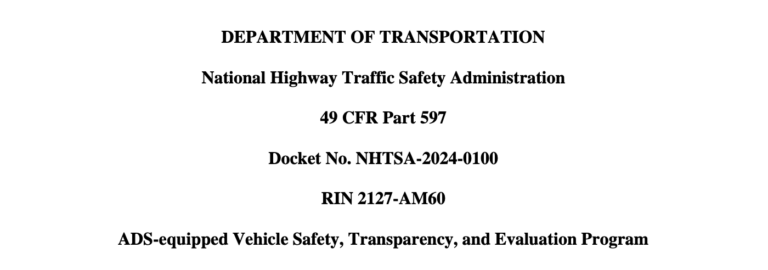The US federal government has released a new set of proposed rules and guidelines for self-driving cars. Currently, no federal regulations specifically govern autonomous vehicles, leaving oversight to individual states.
The US Department of Transportation’s National Highway Traffic Safety Administration first proposed a voluntary national framework for the evaluation and oversight of certain vehicles equipped with automated driving systems at the end of 2024 (December 20).
The ADS-equipped Vehicle Safety, Transparency, and Evaluation Program, known as AV STEP, would establish a voluntary review and reporting framework for participating ADS-equipped vehicles. The program would be open to all companies that operate or plan to operate compliant ADS-equipped vehicles on public roads, as well as those requiring NHTSA exemptions to operate non-compliant vehicles.
“AV STEP would provide a valuable national framework at a pivotal time in the development of ADS technology. Safe, transparent and responsible development is critical for this technology to be trusted by the public and reach its full potential. This proposal lays the foundation for those goals and supports NHTSA’s safety mission,” NHTSA Chief Counsel Adam Raviv said. “We encourage everyone to comment on our proposed program.”
AV STEP would promote greater transparency into participating ADS operations and help the agency study and oversee ADS technology as it matures. Data is fundamental to NHTSA’s work, and the proposed program would provide NHTSA and the public with greater insight into ADS development and operational data.
Further, AV STEP aligns with the Department’s National Roadway Safety Strategy, which was launched in January 2022 by U.S. Transportation Secretary Pete Buttigieg, outlines a comprehensive approach to significantly reducing injuries and deaths on the nation’s highways, roads and streets, and implements a safe system approach.
This enhanced transparency would promote the responsible development of ADS technology, as well as offer a way for vehicle manufacturers, operators, municipalities, researchers and policymakers to benefit from greater opportunities for public awareness and accelerated learning into the technology. Under AV STEP, NHTSA’s assessment of an application would be informed by the views of an independent third-party assessor.
AV STEP would also include two new exemption processes designed to optimize NHTSA’s administration of ADS exemptions, which do not replace NHTSA’s existing exemption processes but, instead, build on the agency’s experience with past ADS exemptions to offer additional paths for regulatory flexibility.
The public will be able to comment on the rule when it is published at https://www.regulations.gov/ in docket No. NHTSA-2024-0100.


